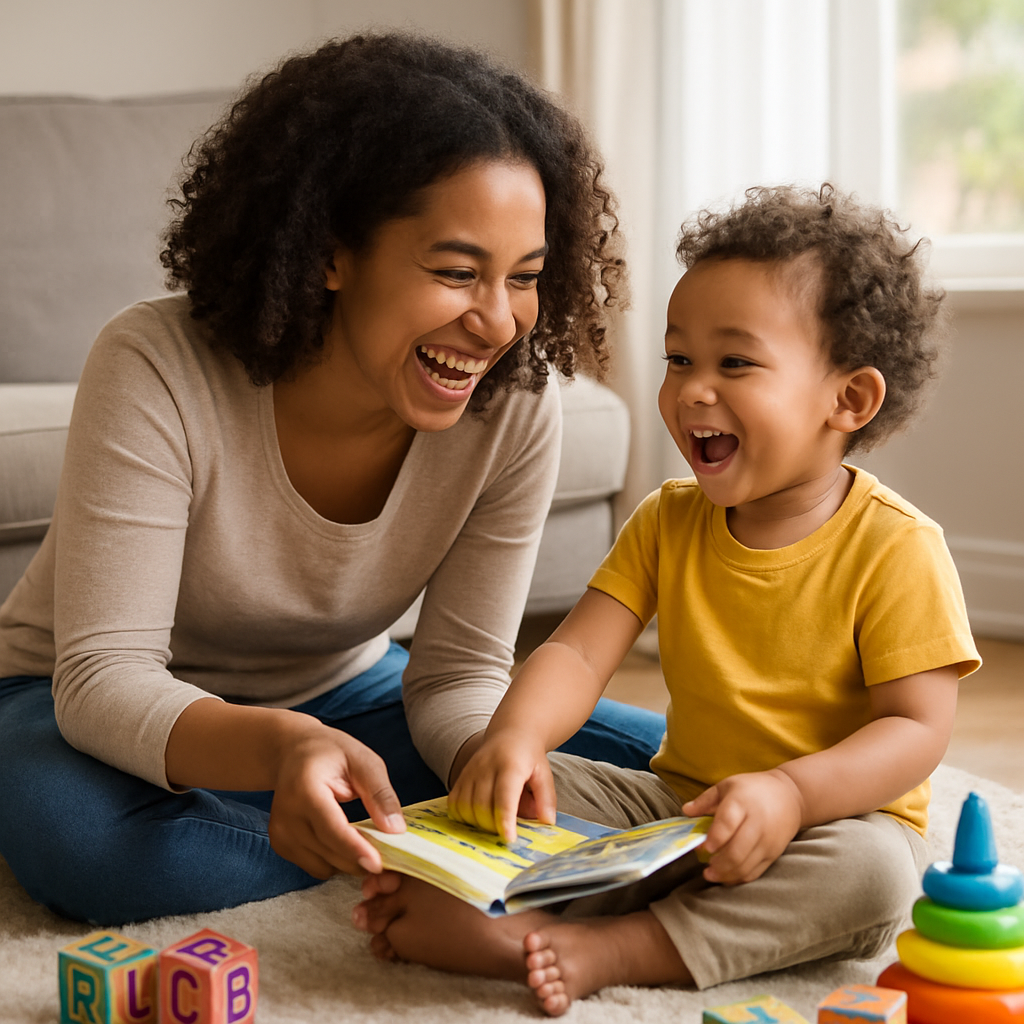Introduction: Why Your Toddler’s First Words Matter
Few moments in parenting are as magical as hearing your child say “Mama” or “Daddy” for the first time. But if you’re wondering when—or how—your toddler will start stringing those words together, you’re not alone.
Language development is a major milestone that sets the stage for your child’s learning, behavior, and social growth. The good news? There’s a lot you can do at home to support and accelerate this process—without pressure or overwhelm.
This guide breaks down proven ways to help your toddler learn to talk in English, especially during the sensitive learning window between 12 and 36 months.
How Do Toddlers Learn to Talk?
Babies are born with the ability to learn any language. But by the toddler years, their brains start to specialize in the language(s) they hear most often.
What’s Happening in the Brain?
Between ages 1 and 3, your child’s brain forms millions of neural connections every second. Language exposure during this window helps “wire” the brain for vocabulary, grammar, and pronunciation.
A study published in Pediatrics found that frequent parent-child conversations directly influence vocabulary size and school readiness by age 3.
When Should My Toddler Start Talking?
Here are typical speech and communication milestones by age:
12–18 Months
- Says 5–20 simple words (e.g., mama, ball, no)
- Follows simple instructions (“Come here”)
- Understands names of familiar people and objects
18–24 Months
- Vocabulary expands to ~50 words
- Starts combining two words (“more juice”)
- Enjoys naming things in books or at home
2–3 Years
- Uses 2–3 word sentences
- Can name most familiar objects
- Speech is ~50–75% understandable to others
???? Note: Every child develops differently. A delay doesn’t always mean a disorder—but early support matters.
What Are the Best Ways to Help My Toddler Talk?
1. Talk—A Lot
Narrate your day. Describe what you’re doing, what your toddler sees, hears, or touches.
Example: “We’re washing the red apple. Now it’s clean! Let’s eat the juicy apple!”
This technique is called self-talk and parallel talk—and it’s powerful.
2. Read Together Daily
Reading is the single best activity for language development. Choose books with:
- Repetitive phrases
- Clear, simple illustrations
- Rhyming patterns (e.g., nursery rhymes)
3. Respond and Expand
If your toddler says “dog,” respond: “Yes! That’s a big brown dog. It’s barking!”
This models more complex language and shows you’re listening.
4. Sing Songs and Rhymes
Simple songs with repetition (e.g., “Twinkle Twinkle”) help toddlers remember and repeat new words.
Bonus: Singing improves memory and rhythm—key for language development.
5. Play, Pretend, and Label
During playtime, label toys, actions, and feelings. Use pretend play to introduce imaginative words:
- “The teddy is sleepy. Let’s put him to bed.”
- “Zoom! The airplane is flying high!”
6. Minimize Screens and Background Noise
The AAP recommends avoiding screens for kids under 2, except for video chatting. Even background TV noise can reduce the number of words a toddler hears per hour.
7. Use Baby Sign Language (Optional)
Some parents find baby signs like “more,” “milk,” and “all done” helpful for toddlers with limited speech. It reduces frustration and may even support verbal language later.
Should I Be Worried About a Speech Delay?
Some toddlers talk later than others—and that’s okay. But here are some red flags to watch for, according to the CDC and NHS:
Talk to your pediatrician if your toddler:
- Doesn’t babble by 12 months
- Says fewer than 10 words by 18 months
- Isn’t combining words by 2 years
- Struggles to follow simple directions
- Has unclear speech after age 3
Early intervention can make a big difference. You might be referred to a speech-language pathologist (SLP) for an evaluation.
Key Takeaways
- The best way to teach your toddler English? Talk to them often, read daily, and play creatively.
- Avoid screen time, and opt for interactive, real-world conversations instead.
- Celebrate every little win—even a new sound or sign.
- If you’re concerned, don’t wait—seek expert advice early.
Suggested Tools & Resources
- CDC Developmental Milestone Checklist
- NHS Speech & Language Tips
- Zero to Three Language Development Guide
Related Articles
- Powerful Milestones Your Baby Must Hit by Age 2
- How Nursery Rhymes Boost Baby’s Brain and Language
- What Communication Skills Should My Baby Have by 6, 12, or 24 Months?
FAQ
Q: Should I correct my toddler’s grammar?
A: No need to correct directly. Instead, repeat their phrase using the correct form: If they say “Me want juice,” say, “Oh! You want juice!”
Q: Can bilingual toddlers get confused?
A: Not at all! Many toddlers learn two languages simultaneously. They may mix words at first, but this is normal and temporary.
Q: How much screen time is okay?
A: The AAP recommends no screen time under age 2, except for live video chats with loved ones.
Q: Is baby talk helpful or harmful?
A: Exaggerated “parentese” (high-pitched, sing-song tone) actually helps babies tune into language sounds. Just avoid made-up nonsense words.
